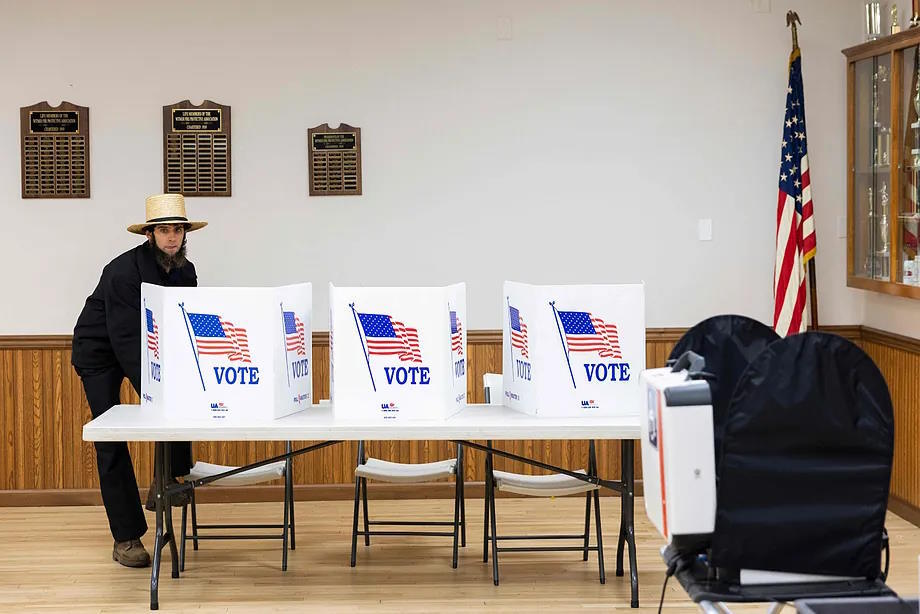In the weeks leading up to the U.S. presidential elections, Donald Trump and his allies became obsessed with Pennsylvania. It was just one of the seven so-called swing states - along with Arizona, North Carolina, Georgia, Michigan, Nevada, and Wisconsin - in play, but the Republican knew that this historically blue state held the key - and the 19 Electoral College votes - to his victory. And that victory would depend, in large part, on a small conservative community, historically apolitical and isolated from the rest of society: the Amish.
Lancaster County, in the southeast of the state, is home to the largest Amish settlement in the world, although the 45,000 residents (out of a total of about 92,000) represent only 6% of its population. They have no social media or cars. They travel through their towns in horse-drawn carriages and dedicate their lives to honoring the word of God and caring for the lands they live on. They are not familiar with rumors or fake news, and they have not been influenced by the candidates' rallies. So, how is it possible that they all knew to vote for the Republican and not for his rival, Kamala Harris?
The story dates back to the beginning of the year. In January, the Pennsylvania Department of Agriculture inspected Amos Miller's farm after alarms were raised about diseases in children related to raw dairy products purchased there. It was not the first time that the farmer, who claimed that his religious beliefs prevented him from following FDA (Food and Drug Administration) guidelines, found himself at odds with the authorities for selling these products without a permit.
Far from abandoning one of their own, the Amish community supported Miller, who was forced to stop selling the milk, which is used to make butter, yogurt, and kefir, a measure they considered "an exaggeration" by the Joe Biden administration and Governor Shapiro's office, whom they demanded more autonomy to live as they wished: with less government intervention. "That was the push for them to say, 'We have to participate'," said an anonymous source to the local outlet Lancaster Farming following the incident. "It's about neighbors helping neighbors," he added, referring to the chain reaction this generated within the community.
But Miller's milk refusal is not an isolated case. "Democratic authorities have harassed the Amish community in many other ways: they have had issues with how they handle dogs, how they care for animals, how they do carpentry work, how they manage workers' compensation, and issues related to insurance," explains Robert Barnes in statements to The Times. The lawyer represented Miller during his case and ended up becoming the de facto political advisor for a whole community that only sought to have the promise that the State of Pennsylvania made to them when they arrived in the 1980s respected: that they would "protect their way of life and beliefs and not harass them for them".
It was never Barnes' intention to convince them to vote for Trump. "But it became increasingly clear that the only way to achieve their legal defense rights was to bring about a political change and gain more political capital, as the Amish were seen as people who did not participate in the electoral system." It's true. Less than half of the Amish population is of legal voting age, and of those who can, normally less than 10% exercise their right to vote, according to an analysis by the Young Center for Anabaptist and Pietist Studies at Elizabethtown College in Lancaster County.
However, this Tuesday, that seemed to change. Several Amish, dressed in their traditional skirts, hats, and vests, headed to the polling stations to cast their votes. "Yes, on their own, they do not form a powerful voting bloc," Barnes acknowledges. "But there are another 250,000 Pennsylvania residents who depend on the Amish for their economic well-being and who have been negatively affected by the Biden administration's measures. Additionally, there are several million people across the country who depend on Amish food and carpentry products," adds the political commentator.
With 98% of the vote counted, Trump has broken the blue wall of the northeast coast, obtaining 50% of the votes in Pennsylvania and 57% in Lancaster County. A scenario that makes it clear that the Amish were not willing to let the government interfere further. "They just wanted to be left alone and be able to do what they know how to do well, and that's how Donald Trump has become their defender almost by default," Barnes predicts.
